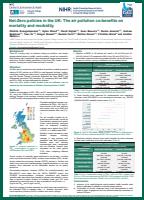
EP-028
-
Net-Zero policies in the UK: The air pollution co-benefits on mortality and morbidity
E-Poster Details >Abstract

EP-028-
Net-Zero policies in the UK: The air pollution co-benefits on mortality and morbidity
Presenting Author: Dimitris Evangelopoulos
Authors: Dimitris Evangelopoulos , Dylan Wood, David Dajnak, Sean Beevers, Nosha Assareh, Andrew Beddows, Tuan Vu, Gregor Stewart, Daniela Fecht, Bethan Davies, Christian Brand, Heather Walton
Presenting Author: Dimitris Evangelopoulos
Authors: Dimitris Evangelopoulos , Dylan Wood, David Dajnak, Sean Beevers, Nosha Assareh, Andrew Beddows, Tuan Vu, Gregor Stewart, Daniela Fecht, Bethan Davies, Christian Brand, Heather Walton
Topic:
Climate
BACKGROUND AND AIM[|]Analysis of climate change-related policies often does not include the air pollution-related impacts on health. Our study aimed to inform how air pollution changes from implementation of the UK Net Zero (NZ) policies affect health, including mortality and multiple morbidity outcomes.[¤]METHOD[|]We modelled UK air quality concentrations in 2030 and 2040 based upon future emissions for Business as Usual (BAU) and the Climate Change Committee’s Balanced Net Zero (BNZP) and Widespread Innovation (WI) pathways for road transport, building heating and active travel. Lifetable analysis was used to quantify the mortality impacts of air quality and physical activity changes associated with the three scenarios (BAU/BNZP/WI). We further quantified the impacts on stroke, acute myocardial infarction (AMI), chronic obstructive pulmonary disease (COPD), asthma in children and adults, lung cancer and hospital admissions. We used concentration-response functions from the UK Committee on the Medical Effects of Air Pollutants (COMEAP), WHO and published meta-analyses, and included analysis with and without a cut-off level (5µg/m³ for PM2.5 or 10µg/m³ for NO2).[¤]RESULTS[|]We identified significant reductions in population weighted average PM2.5 and NO2 concentrations in the UK by 2040 under BAU, BNZP and WI. These reductions, together with changes in active travel, showed that the adoption of the 2040 BNZP policy compared to BAU will result in 4.9 (95% confidence interval: (4.0-5.8)) million lifeyears gained across the UK population up to 2154. We further estimated avoided disease cases including 365,000 (280,000-445,000), 213,000 (158,000-264,000) and 51,000 (33,000-70,000) for stroke, COPD and lung cancer respectively over the same period. Additional benefits for asthma, AMI and cardiorespiratory admissions could be achieved.[¤]CONCLUSIONS[|]Inclusion of air quality/physical activity-related health benefits adds further justification to adoption of climate change policies. Co-benefits of climate measures needs to be disseminated to build positive public engagement and the political leadership necessary to achieve NZ aims.[¤]
